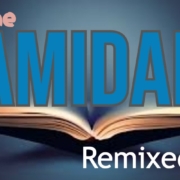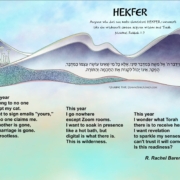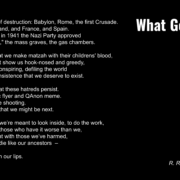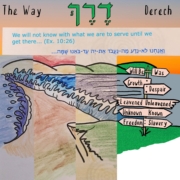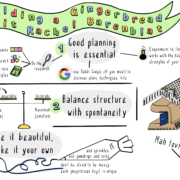Being Real, Digital Edition
 Once there was a toy rabbit who yearned to become Real. He loved his Boy, and he was loved by his Boy. And when his Boy fell ill, the toy rabbit was his constant companion.
Once there was a toy rabbit who yearned to become Real. He loved his Boy, and he was loved by his Boy. And when his Boy fell ill, the toy rabbit was his constant companion.
When the Boy recovered, the doctors said the rabbit was contaminated and needed to be burned. In that darkest night, as the rabbit waited, he wept a tear. And from his tear a flower grew, and from within the flower came the Shechinah. She told him that as he had become real to the Boy who loved him, now he would be real to everyone.
Okay, in the original telling it wasn’t Shechinah, it was a fairy. Close enough.
So in this sacred text — which, as you probably know, is a children’s book by Margery Williams called The Velveteen Rabbit, from which my blog takes its name — the way one becomes Real is through loving and being loved… and through the actions fueled by that love, especially accompanying someone into the darkness of illness and loss. That sounds about right to me.
Becoming Real requires empathy. How can we safely feel empathy in these times of pandemic when there are so many reasons to despair? And how do we accompany each other, as the rabbit accompanied his Boy, when we are physically separated or quarantined?
That last question is the easiest for me to answer: we accompany each other however we can. Write a letter, send an email or text, make a phone call, meet over video… If nothing else, hold the other person in your heart and stretch out your soul to connect with theirs.
During this pandemic we’re learning how to be in community even when we are physically alone. On the second night of Pesach, I sat alone with a Zoom screen in front of me — and R’ David and I co-led a seder for our communities, and it felt real. It wasn’t “as-if” — it was really seder. I imagine many of you had similar experiences.
I remember being a child, getting a long-distance phone call from my parents, and feeling amazed that they could be so far away and I could still hear their voices. There was a bit of a lag, as our voices traveled beneath the ocean, but that didn’t matter.
Remember the miracle of long-distance phone calls? Or the first time you ever saw a loved one’s face over video? Or: imagine reading an email and feeling that a loved one is with you. Or reading a blog post that makes you feel understood. Or texting with a friend, carrying their words and their presence on your smartphone throughout the day.
Our vernacular separates between the internet and “RL,” real life. But connections forged or sustained online are real, just as our davenen together tonight is real.
An emotional and spiritual connection — with another; with community; with our Source — can be real no matter what tools we’re using to create or sustain it. The bigger challenge is being real in the first place. The Velveteen Rabbit reminds us that being real requires openness and empathy enough to companion each other in tight places.
Sometimes it’s hard to be real when someone is suffering. It’s hard to sit with someone in their sorrow. The word compassion means “feeling-with” or “suffering-with.” Being real asks us to feel-with each other.
Sometimes our own struggles prevent us from being real. When my son was born I suffered from postpartum depression, but I told my doctor I was fine, because I was ashamed and I didn’t want him to really see me. That fear kept me from being real.
Sometimes it’s hard to be real with God. Because I get trapped in katnut, in my small human mind. Or because the words of inherited liturgy feel empty. Sometimes prayer can feel like a long-distance call where I’m not sure anyone’s picking up on the other end.
But authentic spiritual life asks us to be real. Our prayers aren’t just words on a page, they’re pointers to lived emotional experience. To really pray the words of Ahavat Olam, or to remix them anew, I have to feel unending love streaming into creation.
And, I also have to be careful about how I channel unending love. Authentic spiritual life asks me to open my heart — to my yearnings, to the needs of others, to my Source — and it also asks me to maintain boundaries. In the language of our mystical tradition, it asks me to balance the overflowing love we call chesed with the healthy limits we call gevurah.
Authentic spiritual life asks us to feel-with each other even during pandemic, even during this time of rising awareness of how systemic racism harms Black and Indigenous People of Color, even in times of personal grief. If we refuse to feel with each other, then we break that nourishing human interconnection that is our obligation and our birthright.
We need to feel, without spiritual bypassing, while maintaining a container strong enough to hold safely. This inner structural integrity can help us build systems and structures of integrity in this world that so needs repair. And that includes our Jewish communities, too: we need to be real in order to build a Jewish spiritual future worthy of the name.
And we need to be real for the sake of our own souls. I’ve learned that the flow of creativity requires me to be real: with myself, with God, with you. The posts and poems and prayers that seem to resonate most are ones written from that place. I think they speak to people deeply precisely because they’re real. It’s my responsibility to cultivate sufficient gevurah to write about what’s real in a way that’s safe for me and for my readers.
In seeking to strike that balance, there’s risk — and there’s also reward. As we read in Mishlei, “As water reflects face to face, so the heart reflects person to person.” (Proverbs 27:19) When I’m willing to be real, others are real in return. You meet my honesty with yours, my heart with yours, my words with yours, my prayers with yours.
Reb Zalman z”l used to say that we all have our own unique login to the Cosmic Mainframe. “To log on to God,” he said in 2004, “we need only awareness, because God is there all the time, making your heart beat.” That login is open to us even in quarantine. We just have to be willing to be real at the table, the meditation cushion, the Zoom screen.
And our connections with each other and with community are still open to us even in quarantine. Online life, online davenen, online friendship: these aren’t “virtual reality.” They’re as real as we allow ourselves to be.
Offered as a keynote teaching at the 2020 Clear Vision Reb Zalman Legacy Shabbaton at Havurah Shir Hadash in Ashland, Oregon — designed to dovetail with the Shabbat morning d’var, given by R’ David Markus, on The Mishkan’s Next Digital (R)Evolution. Reprinted from Velveteen Rabbi.

By Rabbi Rachel Barenblat.

